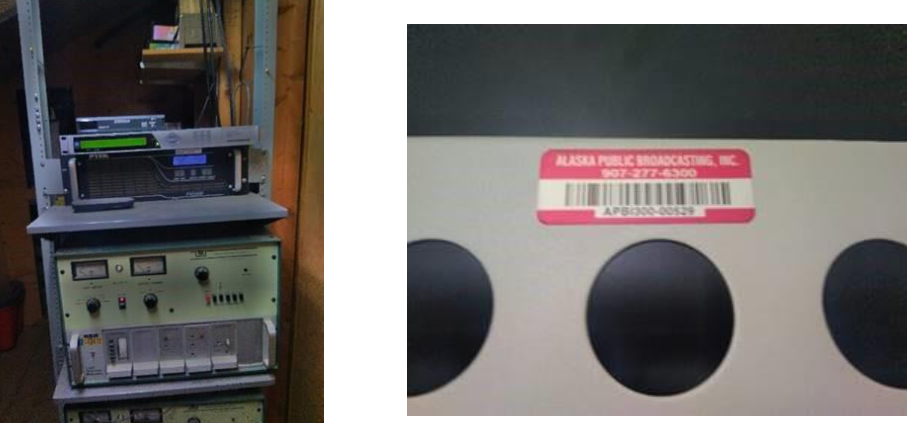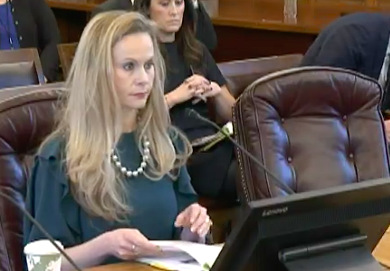DIGITAL CONVERSION PROJECT AFTER 6 YEARS IS HALF BAKED?
Commissioner of Administration Kelly Tshibaka says state has given more than $4.6 million to Alaska Public Broadcasting Inc. over six years to convert rural public broadcasting stations from analog to digital so they will be in compliance with federal law. But despite her department’s efforts, she can’t find out how many are actually converted.
Of the 76 to 115 sites APBI said it “converted” or “deployed” (mailed) conversion equipment to, APBI has no record of which sites are actually transmitting digital signal as of November, 2019, when APBI did not have its contract renewed with the state.
“There is no accurate record of which communities actually have equipment installed,” Tshibaka said. She said her department has anecdotal information that shows that equipment was sent to some communities, but either wasn’t installed or wasn’t maintained by APBI.
For years, Tshibaka said, the State believed that a list of sites labeled as “deployed” or “converted” by APBI means those communities are successfully transmitting digital signal and receiving public media over those digital communications system, but there is no way to knowing if that is accurate because APBI and Alaska Public Broadcasting Commission have been unresponsive.
Tshibaka said that the Alaska Public Broadcasting Commission itself had not met since last June, even though her department is willing and able to provide administrative support to help the commission, so it can fulfill its statutory duty of applying for grants.
It appears that more than 100 of the stations in rural Alaska remain to be converted to digital. But in her presentation, Tshibaka had put a big question mark in that spot, because the information her department has assembled in its investigation has come up against a commission and a public-private corporation that has been resistant to being transparent.
Democrats in the committee room were appalled at the presentation.
Reps. Zack Fields and Jonathan Kreiss-Tomkins said it proved the Dunleavy Administration is hostile to public broadcasting, and Kreiss-Tomkins abruptly left the room to call APBI Executive Director Mollie Kabler to get some points for a rebuttal.
When he returned, he said that the commission and the corporation had a bad relationship with the Dunleavy Administration, and that he wanted to put a stop to the presentation about the performance of the publicly funded entity.
“It feels so unconstructive to have such an antagonistic attitude. It feels as though bad faith or incompetence is being ascribed to the corporation or commission. It’s unfortunate we’re going down this rabbit hole. I suspect a lot of this will be refuted and I suggest we stop doing it,” Kreiss-Tomkins said.
Mollie Kabler, the executive director of APBI, had made a presentation earlier in the week asking the committee to give her corporation more funds. She lives in Kreiss-Tomkins’ district and has been in charge of the contract for its entirety. Kreiss-Tomkins was defending a friend, laying the blame for APBI’s failure on the Dunleavy Administration.
Rep. Zack Fields criticized Tshibaka for her pronunciation of Kwigillingok, saying it was little wonder their equipment wasn’t working since the commissioner of Administration was not pronouncing their community’s name correctly.
“If you can’t pronounce it you can’t maintain it,” he said.
Update: Must Read Alaska has verified that Tshibaka pronounced Kwigillingok correctly.
Fields, earlier this week, had pounded the Dunleavy Administration for an $8,000 a month sole source contract that the Alaska Industrial Development and Export Authority has with Clark Penney.
But during the hearing today, he did not mention any problems with the sole-source contract that the state has had with APBI to convert all the rural communities to digital signals.
In fact, it’s not Tshibaka’s responsibility to install and maintain the equipment; it’s APBI’s contract to perform the work. But the Democrats were shocked that the presentation had information they didn’t want to hear about public broadcasting grants.
Tshibaka’s presentation showed an email exchange between APBI’s technical manager and the tribal leader of Kwig from November, 2019:
Technical Manager, APBI: “I understand the ARCS DTV system in Kwigillingok is still not operating….We have not been able to schedule a technician to come out there over the past several months as we had hoped, due to scheduling and availability issues. … we may be able to send areplacement part, however that would require someone in Kwig to remove the suspect part, packand ship it to us, and take the replacement to the site and install the equipment per our directions.”
Kwigillingok’s Tribal Leader Response: “…we have been promised the technician will be scheduled togo on site visit to make some technical assessments, this is getting exhausting of having to listen todelays! WHO DOES THIS!”

FACTS, NOT FEELINGS
Tshibaka’s presentation showed the difficulty in getting either APBI or its commission APBC to be responsive with information about how it had spent the $4.6 million that was to be used to convert all the 185 rural stations over the pst six years.
Efforts to call each community, using the list of point-of-contacts provided by APBI, resulted in “most of the listed contact numbers were not functional,” Tshibaka said. That indicates that APBI itself had not contacted the communities to monitor the status of their equipment, one could infer from Tshibaka’s statement.
“At this time it is unknown how many of the 185 communities have operational updated digital ARCS systems,” Tshibaka said. “APBI has reported 115 sites out of the 185 sites have been deployed, but it also provided a spreadsheet to DOA of a status of the 185 communities and it shows that 97 sites have been deployed, in contrast to the 115 sites APBI claims.
APBI provided another list to DOA of 98 sites that had been deployed and another list of 77 sites that had been converted, she said.
Deployed means the equipment was sent to the community, while converted means it was successfully installed and is operational.
Dillingham has the equipment deployed, Tshibaka said, but it lacks funds for the electricity to run it so it’s not installed and “converted.”
Larson Bay has the equipment, but no one qualified to install it.
Tshibaka said installing it and getting it operational is APBI’s responsibility — but it appears APBI washed its hands of the problem after mailing the conversion box to the village.
APBI is funded by the state to operate a hotline to help communities troubleshoot problems when their equipment doesn’t work.
The contract with APBI was several contracts, she said, to provide management fees, installation labor, equipment and management of the hotline. Of the $4.6 million, $1.671 is going to the management fee, with $2.96 going to equipment, or “wireless acquisition.”
Committee Chairwoman Rep. Jennifer Johnston said it is evident that time has moved on from Downton Abbey, and public broadcasting is an aging service. “It’s time to modernize,” she suggested, adding that this is a chance to take a look at the whole “old approach” system and “energize” it.
